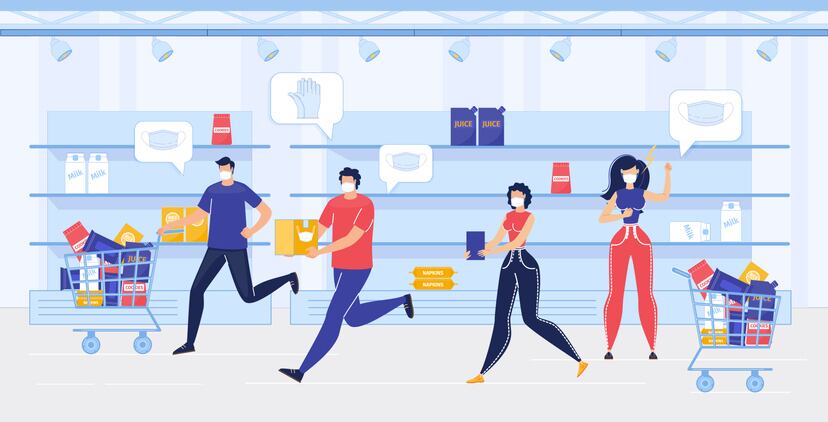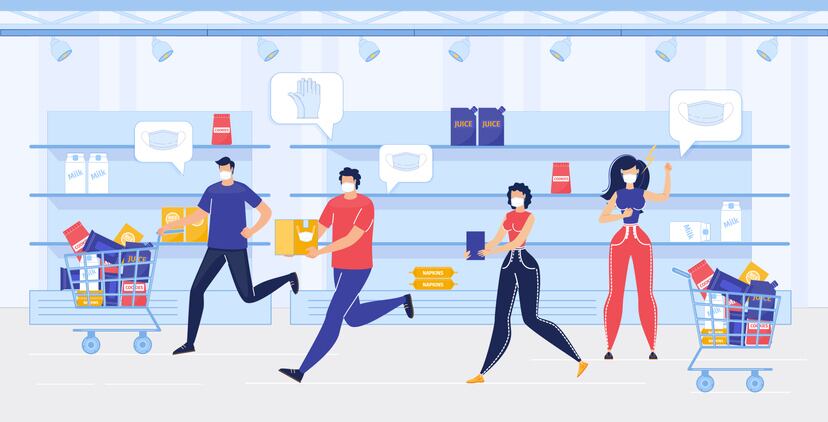A survey of 1,000 US adults conducted April 6-7 by the International Food Information Council that was released April 14 found 42% of respondents said what concerns them the most about food shopping is the health of other shoppers, while 37% cited the health of grocery store employees.
This surpassed the 28% who said their biggest concern was running out of staples, 18% who fear running out of fresh food and 18% who fear not having enough food, according to IFIC.
This mirrors weekly consumer survey data collected and analyzed by the Consumer Brands Association, which shows consumers’ general concern about the novel coronavirus steadily rising week over week since March 4. The most recent data from April 8 shows 63% of respondents are “very concerned” about the virus compared to 37% on March 4. Simultaneously, the percentage of consumers who are not very concerned about COVID-19 has fallen to 5% on April 8 compared to 18% on March 4.
CBA also found that consumer concerns about access to food and beverage products continues to fall and is now nearing the same level as at the start of the pandemic before the spread and impact of COVID-19 was understood by most Americans.
Specifically, it found 65% of survey respondents on April 8 said they were concerned about access to food and beverage products. This was down from 71% the week before on April 1, 72% the week before that and 77% on March 18. On March 11, when the World Health Organization declared the pandemic, concern about accessing food was at 62%, according to CBA.
The steady decline in concern about accessing food and beverage likely is related to more consumers now being well-stocked and not needing to buy as much and also industry strategies to speed re-stocking and production of high-demand products going into effect.
According to CBA, 42% of survey respondents now feel they are well-stocked for two or more weeks and 38% for one to two weeks. In addition, 18% of respondents report seeing “a lot more availability” of high-demand products, while 37% say they are “starting to see more availability on some products.”
IFIC also found that 77% of consumer respondents were confident in the ability of food producers to supply enough food to meet consumer needs for the month ahead.
Despite these improvements, CBA found 44% reported they hadn’t noticed more availability – a figure that underscores industry’s ongoing struggles to meet fully the surging consumer demand during the pandemic.
Confidence in food safety is high
While concern about access to high-demand products continues, albeit to a slightly lesser extent, consumers remain confident in the safety of what is available, according to IFIC’s survey.
It found 82% of survey takers are confident the food they buy is safe, with 39% reporting they are very confident and 43% that they are somewhat confident.
“This number is even higher than IFIC reported in our 2019 Food & Health Survey, in which we asked, ‘Overall, how confident are you in the safety of the US food supply?’. At that point, just over a year ago, 68% were confident in the safety of the food supply (53% somewhat confident and 15% very confident),” IFIC reported.
Improving safety must be a joint effort
With the shift in concern from access sufficient food to safely acquiring it, IFIC’s research revealed that retailers and consumers alike can do more to boost shoppers’ perception of safety as well as increase the protection of all people.
For example, IFIC reports, “when people were asked about actions they’d like to see grocery store employees take to protect the safety of food, almost half (43%) said that frequently wiping down commonly-touched surfaces was important. Other top actions include providing wipes/hand sanitizer (32%) and wearing gloves (28%) and masks (28%).”
While reasonable requests, fulfilling them may be difficult as shortages of cleaners and personal protection equipment, including masks and gloves, persist. Several retailers are pressuring policymakers and government agencies to improve grocery employees’ access to these products, as well as coronavirus testing, by designating them as “emergency personnel” and “extended first responders.”
At the same time that shoppers would like to see retailers and employees do more to slow the spread of coronavirus, IFIC found there is plenty that consumers can do mitigate their risk and that of fellow shoppers.
“There is room for improvement when it comes to recommended health habits and grocery shopping,” IFIC reports. “While frequent hand washing is one of the most well-known suggestions for protecting oneself from COVID-19, only 63% of people report doing so after visiting the grocery store.”
Likewise, it found that to feel more comfortable grocery shopping only 37% report shopping during less busy times, 47% use their own wipes and sanitizer, 35% rinse fresh produce, 16% shop online, 14% buy less fresh and unpacked food and 12% unpack groceries outside.
Younger consumers were less likely to follow risk-reducing precautions than older shoppers, while women more likely to do so then men, according to IFIC.




